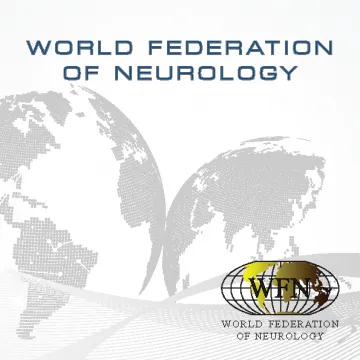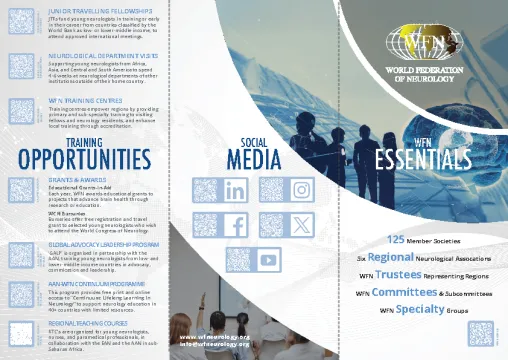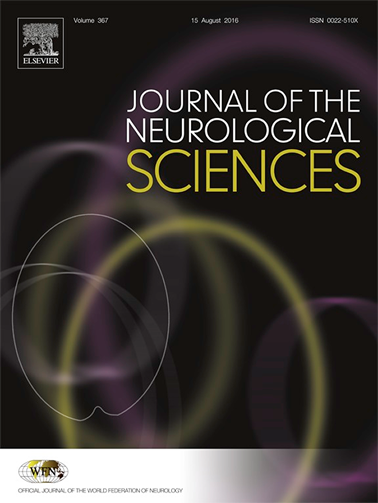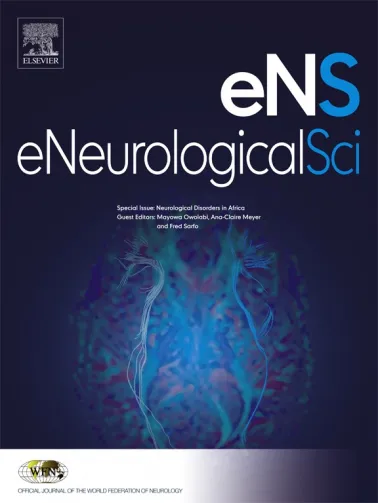WFN Publications
Newsletter |
Journals
|
BrochureWFN Essentials |
Featured Articles
WFN's editors' choices from
Bookshelf
|
|
World Neurology
To keep neurologists across the world informed about what their colleagues in other countries are doing, our bi-monthly newsletter, World Neurology, is posted on the WFN website, and mailed on request to almost 30,000 individual specialists belonging to our member societies.
The Journal of the Neurological Sciences
The Journal of the Neurological Sciences is the official journal of the World Federation of Neurology.
The journal provides a medium for the prompt publication of original articles in neurology and neuroscience from around the world.
JNS places special emphasis on articles that:
- provide guidance to clinicians around the world (Best Practices, Global Neurology);
- report cutting-edge science related to neurology (Basic and Translational Sciences);
- educate readers about relevant and practical clinical outcomes in neurology (Outcomes Research); and
- summarize or editorialize the current state of the literature (Reviews, Commentaries, and Editorials).
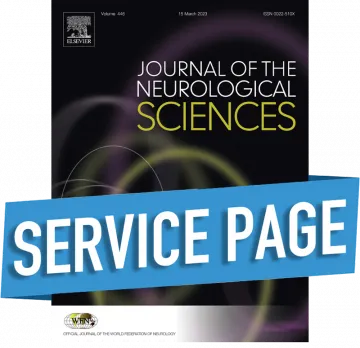 JNS Service Page
JNS Service Page
The WFN Service Page of the JNS is an editorial section aimed at informing and increasing the awareness of the WFN activities in several aspects, in particular with regard to education, the global activities with the WHO and UN ECOSOC, and the projects of the WFN.
eNeurologicalSci (eNS)
eNeurologicalSci is the official open access journal of WFN.
eNS accepts most types of manuscripts for consideration including original research papers, short communications, reviews, book reviews, letters to the Editor, opinions and editorials.
Topics considered will be from neurology-related fields that are of interest to practicing physicians around the world. Examples include neuromuscular diseases, demyelination, atrophies, dementia, neoplasms, infections, epilepsies, disturbances of consciousness, stroke and cerebral circulation, growth and development, plasticity and intermediary metabolism.
The fields covered may include neuroanatomy, neurochemistry, neuroendocrinology, neuroepidemiology, neurogenetics, neuroimmunology, neuroophthalmology, neuropathology, neuropharmacology, neurophysiology, neuropsychology, neuroradiology, neurosurgery, neurooncology, neurotoxicology, restorative neurology, and tropical neurology.
Bookshelf
Advocacy |
|
|---|---|
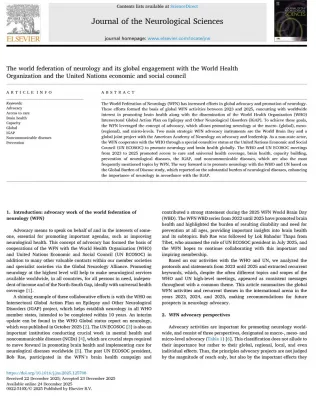 |
The World Federation of Neurology and its global engagement with the World Health Organization and the United Nations economic and social council ⧉Author: Alla Guekht ∙ Ksenia Pochigaeva ∙ Morris Freedman ∙ Steven L. Lewis ∙ Guy Rouleau ∙ Chandrashekhar Meshram ∙ Mohammad Wasay ∙ Tissa Wijeratne ∙ Wolfgang Grisold Publication: Journal of the Neurological Sciences, 2025, 125708, DOI: https://doi.org/10.1016/j.jns.2025.125708 ⧉ The World Federation of Neurology (WFN) has increased efforts in global advocacy and promotion of neurology. These efforts formed the basis of global WFN activities between 2023 and 2025, concurring with worldwide interest in promoting brain health along with the dissemination of the World Health Organization (WHO) Intersectoral Global Action Plan on Epilepsy and Other Neurological Disorders (IGAP). |
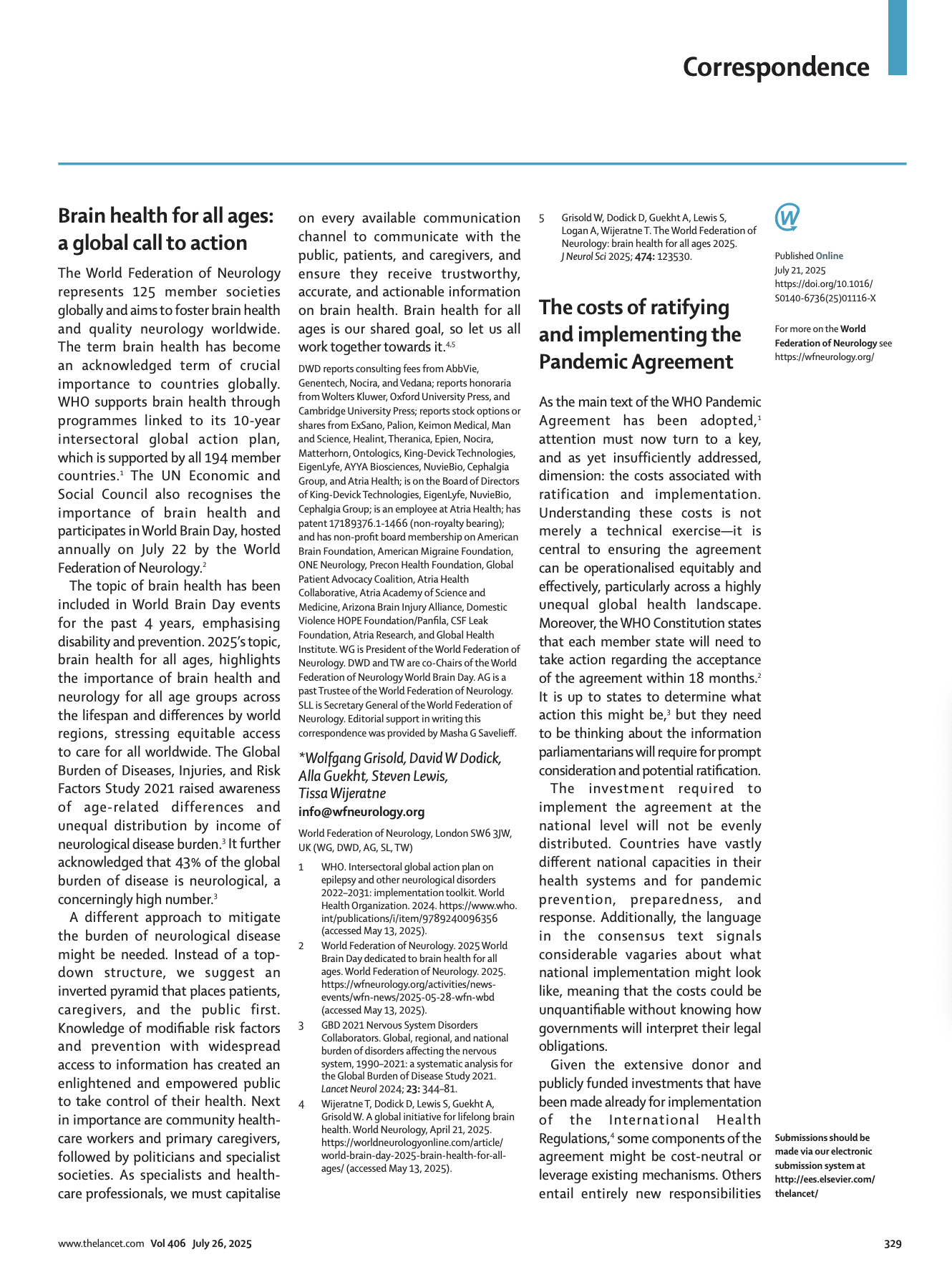 |
Brain health for all ages: a global call to action ⧉Author: Wolfgang Grisold info@wfneurology.org ∙ David W Dodick ∙ Alla Guekht ∙ Steven Lewis ∙ Tissa Wijeratne Publication: The Lancet Neurology, Volume 406, Issue 10501. July 26, 2025 DOI: https://doi.org/10.1016/S0140-6736(25)01116-X ⧉ The World Federation of Neurology represents 125 member societies globally and aims to foster brain health and quality neurology worldwide. The term brain health has become an acknowledged term of crucial importance to countries globally. WHO supports brain health through programmes linked to its 10-year intersectoral global action plan, which is supported by all 194 member countries.1 The UN Economic and Social Council also recognises the importance of brain health and participates in World Brain Day, hosted annually on July 22 by the World Federation of Neurology. |
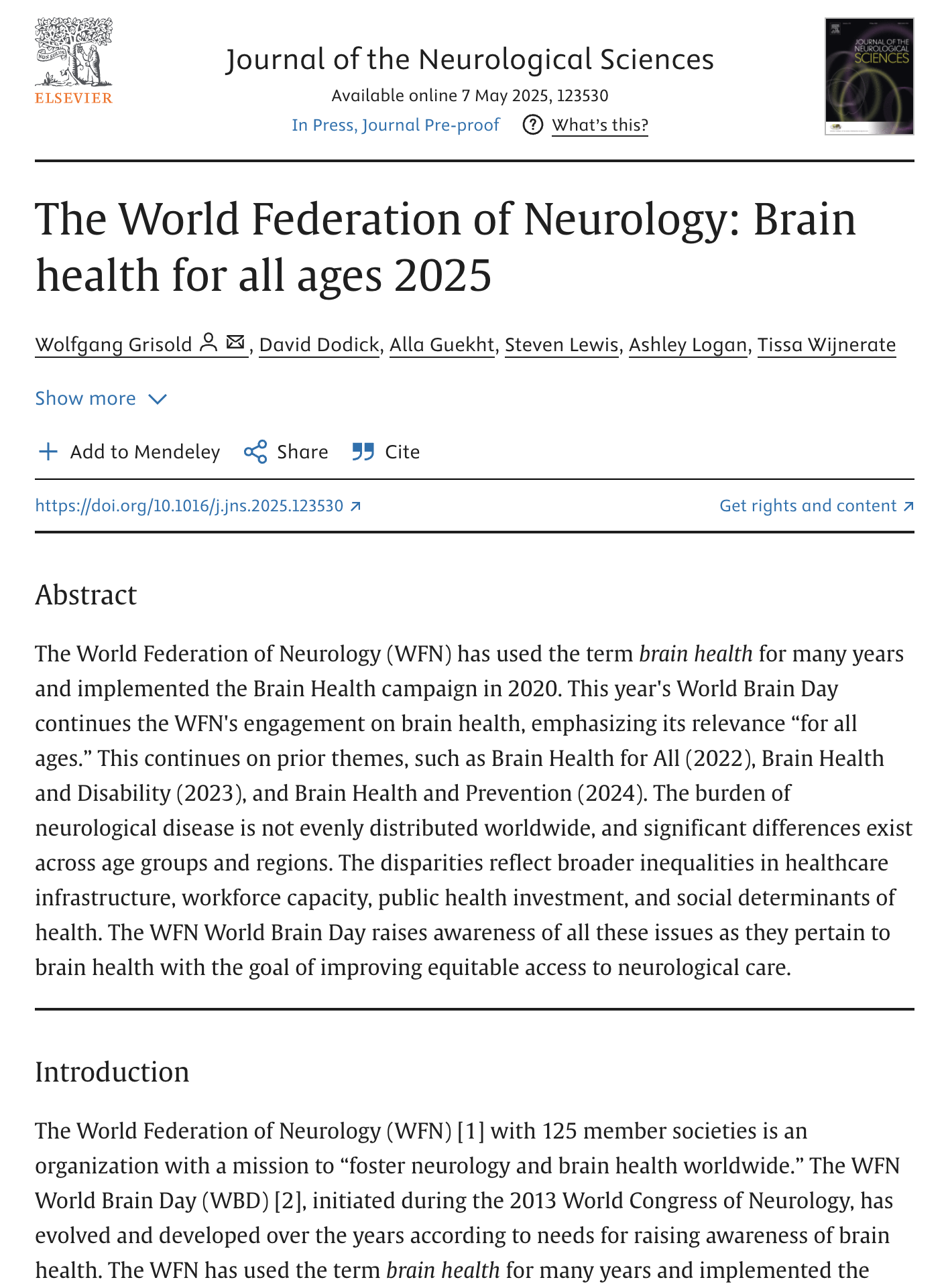 |
The World Federation of Neurology: Brain health for all ages 2025 ⧉Author: Wolfgang Grisold , David W Dodick, Alla Guekht, Steven L Lewis, Tissa Wijeratne Publication: Journal of the Neurological Sciences. 2025 May 7 DOI: https://doi.org/10.1016/j.jns.2025.123530 ⧉ World Brain Day 2025 continues the WFN's engagement on brain health, emphasising its relevance "for all ages." This continues on prior themes, such as Brain Health for All (2022), Brain Health and Disability (2023), and Brain Health and Prevention (2024). This year's topic expands on what is implicit in the title of brain health: the healthy brain is essential and needs to function optimally at all stages of life, from development to older age. |
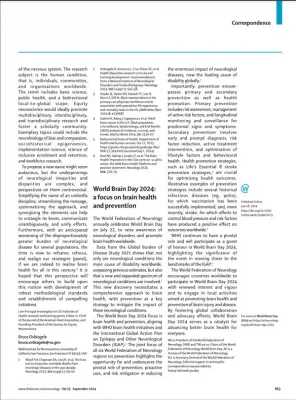 |
World Brain Day 2024: a focus on brain health and prevention⧉Author: Wolfgang Grisold , David W Dodick, Alla Guekht, Steven L Lewis, Tissa Wijeratne Publication: The Lancet Neurology. 2024 Jul 18. DOI: https://doi.org/10.1016/S1474-4422(24)00270-9 ⧉ The World Brain Day 2024 focus is brain health and prevention, aligning with WHO brain health initiatives and the Intersectoral Global Action Plan on Epilepsy and Other Neurological Disorders (IGAP). The joint focus of all six World Federation of Neurology regions on prevention highlights the opportunity for and underscores the pivotal role of prevention, proactive care, and risk mitigation in reducing the enormous impact of neurological diseases, now the leading cause of disability globally. |
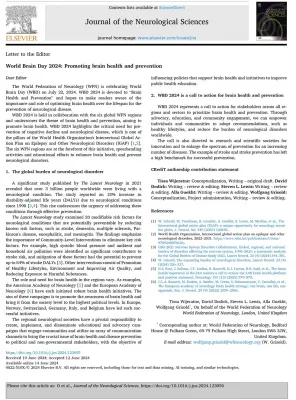 |
World Brain Day 2024: Promoting brain health and prevention ⧉Author: Tissa Wijeratne, David Dodick, Steven L. Lewis, Alla Guekht, Wolfgang Grisold, on behalf of WFN Publication: Journal of the Neurological Sciences. 2024 Jun 14 DOI: 10.1016/j.jns.2024.123095 ⧉ WBD 2024 represents a call to action for stakeholders across all regions and sectors to prioritize brain health and prevention. Through advocacy, education, and community engagement, we can empower individuals and communities to adopt recommendations, such as healthy lifestyles, and reduce the burden of neurological disorders worldwide. |
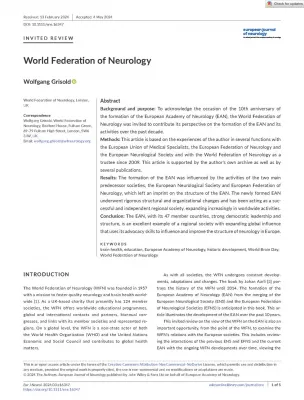 |
World Federation of Neurology ⧉Author: Wolfgang Grisold Publication: European Journal of Neurology. 2024 June 12 DOI: 10.1111/ene.16347 ⧉ To acknowledge the occasion of the 10th anniversary of the formation of the European Academy of Neurology (EAN), the World Federation of Neurology was invited to contribute its perspective on the formation of the EAN and its activities over the past decade. This invited review on the view of the WFN on the EAN is also an important opportunity, from the point of the WFN, to examine the WFN's relations with the European societies. This includes reviewing the interactions of the previous ENS and EFNS and the current EAN with the ongoing WFN developments over time, viewing the present state of the EAN and WFN and visualizing the future. This article is composed of four components: (1) the historical development and role of the WFN, (2) the EAN, (3) the EAN and WFN and (4) the past and the future. |
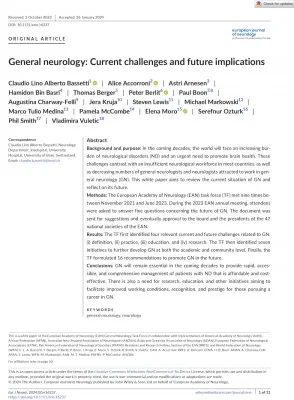 |
General neurology: Current challenges and future implications ⧉Authors: Claudio Lino Alberto Bassetti, Alice Accorroni, Astri Arnesen, Hamidon Bin Basri, Thomas Berger, Peter Berlit, Paul Boon, Augustina Charway-Felli, Jera Kruja, Steven Lewis, Michael Markowski, Marco Tulio Medina, Pamela McCombe, Elena Moro, Serefnur Ozturk, Phil Smith, Vladimira Vuletic Publication: European Journal of Neurology. 2024 Mar 28:e16237 DOI: 10.1111/ene.16237 ⧉ This is a white paper of the European Academy of Neurology (EAN) General Neurology Task Force in collaboration with representatives of American Academy of Neurology (AAN), African Federation (AFAN), Australian New Zealand Association of Neurologists (ANZAN), Asian and Oceanian Association of Neurology (AOAN), European Federation of Neurological Associations (EFNA), Pan American Federation of Neurological Societies (PAFNS), Residents and Research Fellows Section of the EAN (RRFS), and World Federation of Neurology (WFN). |
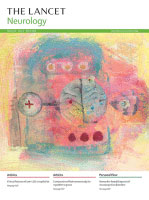 |
The expanding burden of neurological disorders ⧉Authors: Wolfgang Grisold Publication: The Lancet Neurology. 2024 Mar 14. ⧉ DOI: 10.1016/S1474-4422(24)00086-3 New estimates of the global, regional, and national burden of disorders affecting the nervous system are reported in an updated analysis from the Global Burden of Diseases, Injuries, and Risk Factors Study (GBD) 2021. In their Article in The Lancet Neurology, the GBD 2021 Nervous System Disorders Collaborators report mortality, prevalence, years lived with disability (YLDs), years of life lost (YLLs), and disability-adjusted life-years (DALYs) attributable to diseases and conditions that cause dysfunction of the nervous system. |
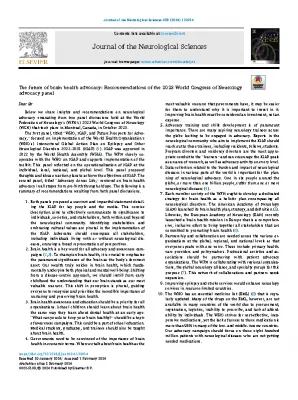 |
The future of brain health advocacy: Recommendations of the 2023 World Congress of Neurology advocacy panel ⧉Authors: Mohammad Wasay, Wolfgang Grisold, Tissa Wijeratne, Walter Struhal, Safa Younis, Publication: Journal of the Neurological Sciences, Volume 458, 2024, 122914, ISSN 0022-510X. DOI: 10.1016/j.jns.2024.122914 Article shares insights and recommendations on neurological advocacy emanating from two panel discussions held at the World Federation of Neurology's (WFN's) 2023 World Congress of Neurology (WCN) that took place in Montreal, Canada, in October 2023. |
 |
Brain health, disability, and the need for broader thinking ⧉Publication: The Lancet Neurology. Editorial, 2023, Sep 22(9):769 DOI: 10.1016/S1474-4422(23)00236-3 Improving access to rehabilitation is crucial but other aspects of health care and perceptions also need to change. For example, access to other types of care, including palliative care, has to improve, and barriers to seeking care, including stigma, need to be removed. Health-care professionals, including neurologists, need to be aware of patients' needs and the social context of disability, including to ensure that services are accessible to people with different mobility and communication needs. Health-care professionals also need to be sensitive to what their patients want and be mindful of the disability paradox, whereby the clinician's perception of quality of life can differ from that of the patient. |
 |
World Brain Day 2023 - Brain Health and Disability: "Leave no one behind" ⧉Authors: Tissa Wijeratne, David W. Dodick, Steven L. Lewis, Alla Guekht, Ksenia Pochigaeva, Wolfgang Grisold Publication: Journal of the Neurological Sciences, 2023, 120720, ISSN 0022-510X DOI: 10.1016/j.jns.2023.120720 Worldwide, the number of persons with disability is assumed to be around 1.3 billion. Although several definitions exist, such as the medical and social models, the social model has more holistic approaches and engulfs more aspects. Historically, many considerations were based on eugenics until the middle of the 20th century when a change of paradigm occurred, and disability has since been subject to many developments in the past decades. |
 |
Uniting for global brain health: Where advocacy meets awareness. ⧉Authors: Sebastian F. Winter, Donna Walsh, Wolfgang Grisold, Justin T. Jordan, Pratibha Singhi, J. Helen Cross, Alla Guekht, Tadeusz Hawrot, Frédéric Destrebecq, Valery L. Feigin, Symon M. Kariuki, Mayowa O. Owolabi, Gagandeep Singh, Jorg Dietrich, Audrey Craven, Action Amos, Man Mohan Mehndiratta, Mary Secco, Gus A. Baker, Francesca Sofia Publication: Epilepsy & Behavior. 2023 Aug 1;145. DOI: 10.1016/j.yebeh.2023.109295 In a historic vote, the World Health Organization (WHO)'s 194 Member States unanimously adopted the Intersectoral Global Action Plan on Epilepsy and Other Neurological Disorders 2022–2031 (IGAP), committing to ''reduce the stigma, impact and burden of neurological disorders |
 |
Advocacy for patients with headache disorders ⧉Authors: Gouider R, Lorenz DH, Craven A, Grisold W, Dodick DW. Publication: Eneurologicalsci. 2023 May 10:100466. DOI: 10.1016/j.ensci.2023.100466 Primary headache disorders are worldwide highly prevalent and burdensome and should be therefore considered as a global public health priority. However, too many patients with primary headache disorders still do not receive satisfying care. The most likely identified reasons for such a scenario - lack of public awareness, stigma, lack of trained professionals with inadequate healthcare systems and policies - are remediable. Despite the progresses that were made in headache advocacy, these efforts have not yielded substantial improvements in research funding or access to specialty care and even standards of care. The situation is more complex in Low and Middle Income Countries (LMICs) where headache advocacy is urgently needed given the magnitude of the difficulties that patients with primary headache disorders face in accessing care. See also ABCs of Headache: Advocacy, Biology, Care ⧉ |
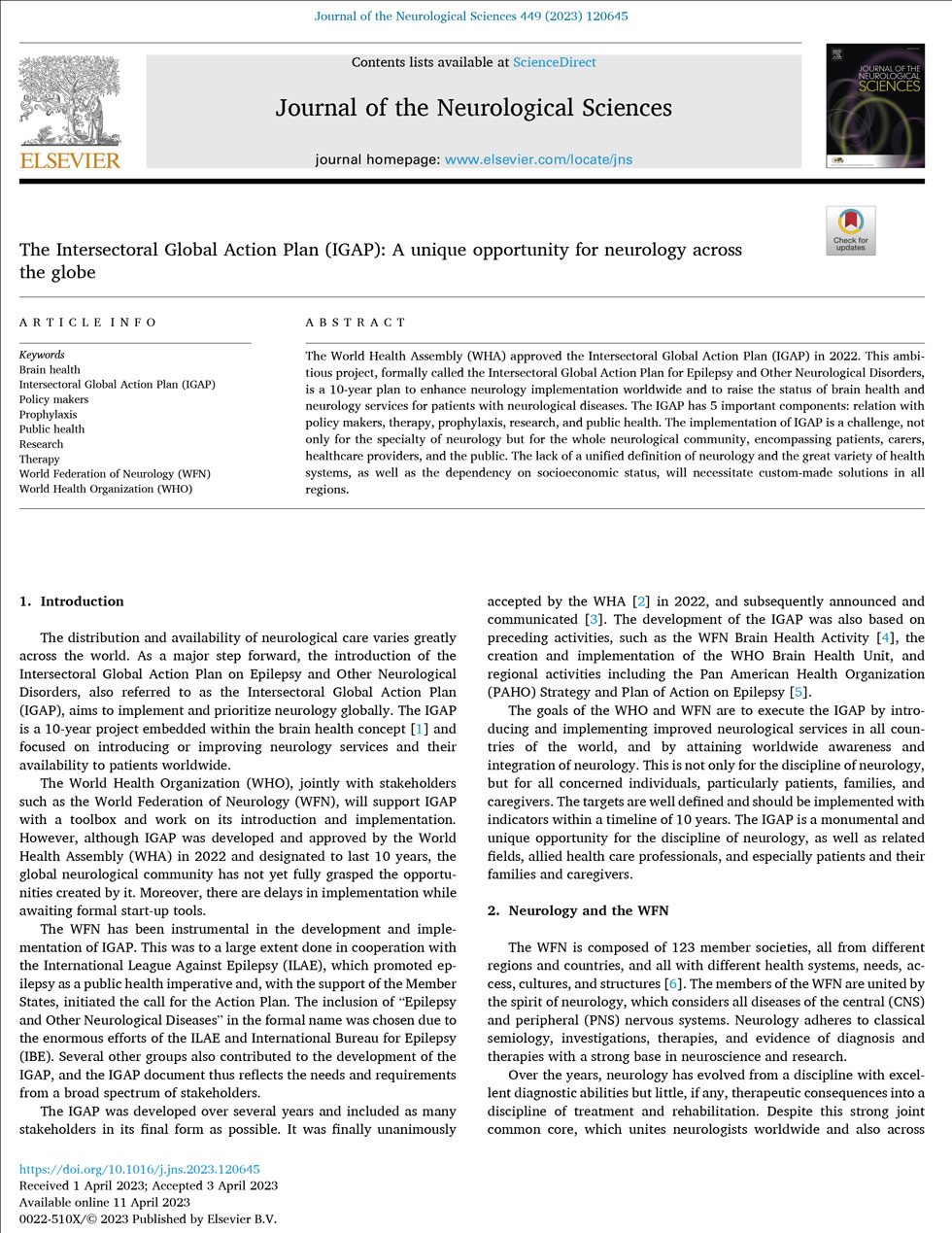 |
The Intersectoral Global Action Plan (IGAP): A unique opportunity for neurology across the globe ⧉Editors: Wolfgang Grisold, Morris Freedman, Riadh Gouider, Alla Guekht, Steven Lewis, Marco Medina, Chandrashekhar Meshram, Guy Rouleau, Richard Stark, on behalf of the Trustees of the World Federation of Neurology Published: 11 April 2023 Publication: Journal of the Neurological Sciences. 2023 Apr 11:120645. DOI: 10.1016/j.jns.2023.120645 The World Health Assembly (WHA) approved the Intersectoral Global Action Plan (IGAP) in 2022. This ambitious project, formally called the Intersectoral Global Action Plan for Epilepsy and Other Neurological Disorders, is a 10-year plan to enhance neurology implementation worldwide and to raise the status of brain health and neurology services for patients with neurological diseases. The IGAP has 5 important components: relation with policy makers, therapy, prophylaxis, research, and public health. The implementation of IGAP is a challenge, not only for the specialty of neurology but for the whole neurological community, encompassing patients, carers, healthcare providers, and the public. The lack of a unified definition of neurology and the great variety of health systems, as well as the dependency on socioeconomic status, will necessitate custom-made solutions in all regions. |
.jpg) |
ABCs of Headache: Advocacy, Biology, Care ⧉Editors: David W. Dodick and Wolfgang Grisold Published: 13 September 2022 Publication: eNeurologicalSci (Open Access) This special issue collects articles that cover the epidemiology, biology, and treatment advances of primary headache disorders with an emphasis on migraine. Highlights
|
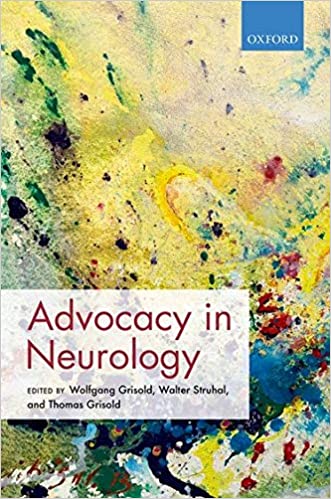 |
Advocacy in Neurology ⧉Published: February 2019 Editors: Wolfgang Grisold, Walter Struhal, Thomas Grisold Publisher: Oxford University Press DOI: 10.1093/med/9780198796039.001.0001 This book focuses on advocacy activities in the field of neurology. Neurology deals with heterogeneous and diverse populations of patients, who suffer from disability, chronic, and often progressive diseases. The complex characteristics of neurological diseases yield exceptional challenges to plan for and implement advocacy activities on all levels. All stakeholders are challenged to provide the support patients need; advocacy facilitates this process and bundles efforts to reach the objective of the advocacy task. Building on the premise that advocacy goes beyond merely theoretical claims, this book collects and organizes advocacy approaches in practice. Thereby, we draw on different dimensions of 'advocacy in neurological practice' and discuss implications for management, healthcare, planning, and policymaking. |




